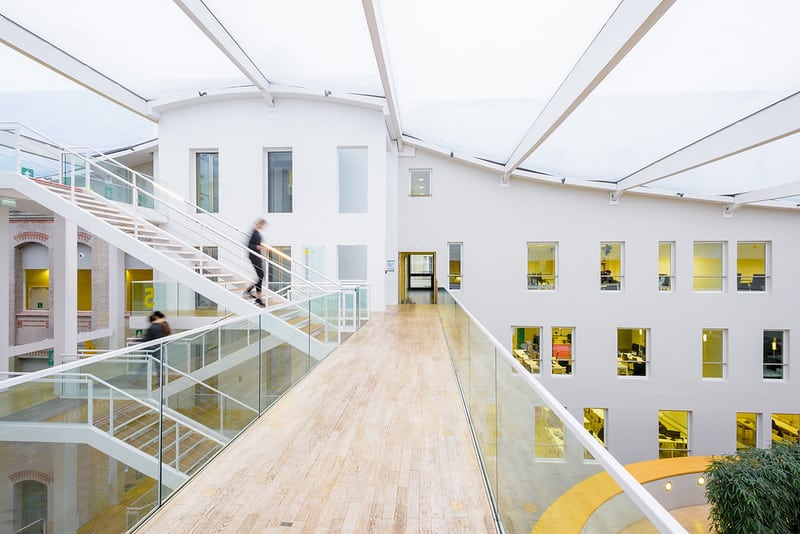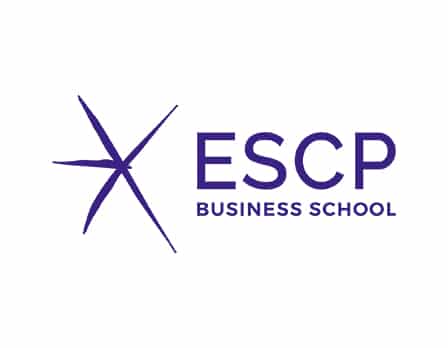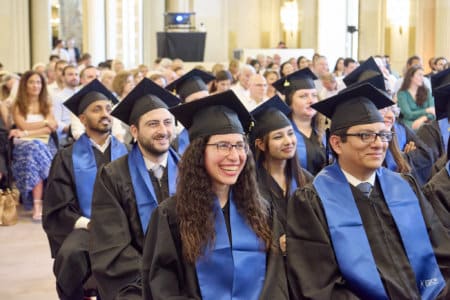A multicultural experience — that’s what Edoardo Peruzzi was seeking. Having grown up in Italy and then moving to a mid-sized city to work for a few years, he was eager to expand his horizons beyond what he already knew. “Living in places dominated by single cultures made me feel like an outsider,” he says.
It was then that he heard of the MBA in International Management at ESCP Business School. With campuses in Berlin, London, Madrid, Turin, Paris and Warsaw, the ESCP MBA gives students the chance to study and live in up to three European countries. It’s the perfect programme for young professionals to gain in-demand business skills whilst expanding their global outlook.
The ESCP MBA is unique for its distinct international experience. “As a student, I was thrilled by the prospect of learning from more than 20 different nationalities,” says Peruzzi. “From day one, I was exposed to a wide range of perspectives that broadened my horizons and made me question the assumptions I had formed.”
In an increasingly globalised world, being able to traverse various cities and cultures is certainly a strong asset. “The MBA’s international faculty provides students with a multi-dimensional outlook, fostering creative and critical thinking,” shares Léon Laulusa, Senior EVP and Dean for Academic Affairs and International Relations. “These elements interact to shape outstanding purpose-driven leaders of tomorrow.”
It’s a strategy that works. ESCP’s MBA has gained an international reputation for excellence, leading to a ranking of 27th worldwide and eighth in Europe by the Financial Times. It’s also the number one programme worldwide for International Course Experience and third for value for money.

MBA in International Management students can live and study in up to three European countries. Source: ESCP Business School
An MBA that adapts to your needs
From job seekers and entrepreneurs looking for a career change to those wanting to relocate for work, the MBA is designed to accommodate as many types of learners as possible. Students can pursue the MBA on campus, online or in a hybrid format in 10 to 34 months, allowing them to tailor their learning according to their own availability and personal responsibilities.
Peruzzi started out at ESCP’s London campus. “Since I was already living in the UK and visiting London on a weekly basis, the transition was very smooth,” he explains. “The main difference I noticed from an educational point of view was the contrast with the ‘Italian method,’ which is very theoretical and based mainly on books.”
Students have the opportunity to engage in two company consultancy projects. The school’s active collaboration with industry leaders ensures they are constantly informed by changes in the market. Associate Dean of the MBA Professor Laura Reyero says this adaptability is critical to staying one step ahead, especially when considering the impact of new technologies and social changes on the business world.
“Nobody knows what is going to happen tomorrow, we only know what is most likely to happen,” she says. “Hence, when designing the curriculum, we adapt the courses taking into account present circumstances and what we estimate is going to happen. If something disruptive appears, we are committed to including it in the MBA journey as quickly as possible.”
Interspersed between these are plenty of chances to tailor the MBA according to one’s own interests and goals. Choose one of four specialisations: Consultancy, Entrepreneurship, Fintech and Innovation, and Luxury. Then there are the various dedicated MBA career services, individual coaching and mentorship, professional self-knowledge seminars and bootcamps, networking opportunities, and more.

ESCP’s MBA is designed to be adaptable to the changes of tomorrow. Source: ESCP Business School
For a more sustainable future
Humankind has never faced a more critical and urgent crisis than the one presented by climate change. It presents a need for swift and decisive action — and future business leaders will be at the helm of this. Business schools thus have a responsibility to integrate considerations for sustainability into their curricula.
Being fourth in the world for ESG Teaching and Carbon Footprint, the ESCP MBA was specifically designed to tackle this challenge. Sustainability and Entrepreneurship is a core module taken by every MBA student, and mandatory courses on Ethics, Responsibility and Sustainability are a central aspect of every programme at ESCP. Then there are the many consultancy projects and over 200 electives on ethics, sustainability and social issues.
School-wide, sustainability is the first pillar of ESCP’s new strategy. In this, ESCP is integrating more stakeholders in its sustainability processes. A full-fledged sustainability department with 16 professors connects to all other teaching programmes, making for the quick dissemination of information across all European campuses.

At ESCP, 100% of students are trained in sustainability practices. Source: ESCP Business School
This is integral to creating an environment that encourages future business leaders to adopt more ESG-focused practices. “The MBA programme of ESCP Business School makes a clear statement that sustainability must be an integral part of a top manager’s training and ethos,” says Aurélien Acquier, full professor of Strategy and Sustainability in the Department of Management. “Rather than specialised sustainability managers, we want to create managers with a sustainability mindset.”
As MBA graduates, they are geared for the demands of the world ahead of them — and naturally, find success in whatever path they chart for themselves.
“Take the leap and embrace this transformative experience,” encourages Peruzzi. “Yes, it can be challenging at times, but it is also incredibly rewarding. Don’t be afraid to take risks and step outside of your comfort zone. There is an entire world to discover, and you should take advantage of the numerous opportunities provided by ESCP!”
Follow ESCP Business School on Facebook, Twitter, LinkedIn, YouTube, Instagram and TikTok













